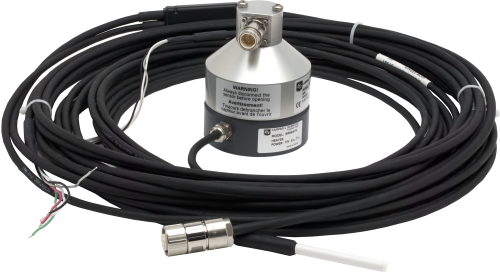This product has limited availability. Some accessories, replacement parts, or services may still be available when it is no longer available.

Overview
Note: This product has limited availability. Please consider the SnowVue™10 Digital Snow-Depth Sensor for snow-depth measurements and the TempVue™20 Pt100 Digital Air Temperature Sensor or HygroVue™10 Digital Temperature and Relative Humidity Sensor with M12 Connector for air temperature measurements.
The SR50ATH is a sonic distance sensor with an integrated external temperature probe and heater. Sonic sensors determine distance by emitting an ultrasonic pulse and then measuring the elapsed time between the emission and return of the pulse. The temperature probe allows the SR50AT series to output temperature-corrected values (speed of sound varies with temperature). The integrated heater prevents ice and rime from coating the transducer.
Read MoreBenefits and Features
- Integrated temperature probe for providing temperature correction of measurements
- Non-contact method for determining snow depth
- Wide operating temperature range
- Integrated transducer heater; rugged enough for rime and ice environments
- User-selectable options for output
- Uses a multiple echo processing algorithm to help ensure measurement reliability
- Compatible with most Campbell Scientific data loggers
Images






Detailed Description
The SR50ATH is an identical unit to the SR50A with the addition of an external temperature sensor and transducer heater. The temperature sensor requires a six-plate radiation shield. The addition of a heating element around the transducer prevents ice and rime from coating the transducer with minimal power requirements. The SR50ATH outputs a temperature-corrected distance reading, eliminating the need for further post-processing, as well as a separate temperature reading.
The SR50ATH was designed to meet the stringent requirements of measuring snow depths and uses a multiple echo processing algorithm to help ensure measurement reliability. The SR50ATH is compatible with all current Campbell Scientific data loggers, as well as many other data acquisition systems.
Compatibility
Note: The following shows notable compatibility information. It is not a comprehensive list of all compatible or incompatible products.
Data Loggers
| Product | Compatible | Note |
|---|---|---|
| CR1000 (retired) | SDI-12 and RS-232. For RS-485, requires an MD485 interface or similar RS-485 to RS-232 interface. | |
| CR1000X (retired) | SDI-12 and RS-232. For RS-485, requires an MD485 interface or similar RS-485 to RS-232 interface. | |
| CR300 (retired) | SDI-12 and RS-232. For RS-485, requires an MD485 interface or similar RS-485 to RS-232 interface. | |
| CR3000 (retired) | SDI-12 and RS-232. For RS-485, requires an MD485 interface or similar RS-485 to RS-232 interface. | |
| CR310 | SDI-12 and RS-232. For RS-485, requires an MD485 interface or similar RS-485 to RS-232 interface. | |
| CR350 | SDI-12 and RS-232. For RS-485, requires an MD485 interface or similar RS-485 to RS-232 interface. | |
| CR6 | SDI-12, RS-232, and RS-485 | |
| CR800 (retired) | SDI-12 and RS-232. For RS-485, requires an MD485 interface or similar RS-485 to RS-232 interface. | |
| CR850 (retired) | SDI-12 and RS-232. For RS-485, requires an MD485 interface or similar RS-485 to RS-232 interface. |
Distributed Data Acquisition
| Product | Compatible | Note |
|---|---|---|
| Granite 6 | SDI-12 and RS-232. For RS-485, requires an MD485 interface or similar RS-485 to RS-232 interface. |
Additional Compatibility Information
Data Logger Considerations
One single-ended channel per probe is required; an excitation channel can be shared by several probes.
Specifications
| Measurement Time | < 1.0 s |
| Output Options | SDI-12 version 1.3, RS-232, RS-485 (output options selected by configuring internal jumpers) |
| Baud Rates | 1200 to 38400 bps (RS-232, RS-485 modes) |
| Power Requirements | 9 to 18 Vdc (typically powered by data logger’s 12 Vdc power supply) |
| Quiescent Power Consumption in SDI-12 Mode | < 1.0 mA without heater |
| Quiescent Power Consumption in RS-232/RS-485 Mode |
|
| Active Power Consumption | 250 mA typical without heater |
| Measurement Range | 0.5 to 10 m (1.6 to 32.8 ft) |
| Beam Acceptance | ~30° |
| Resolution | 0.25 mm (0.01 in.) |
| Accuracy | ±1 cm (0.4 in.) or 0.4% of distance to target (whichever is greatest). |
| Operating Temperature Range | -45° to +50°C |
| Temperature Accuracy |
|
| Compliance | CE compliant |
| Diameter | 7.5 cm (3 in.) |
| Length | 10.1 cm (4.0 in.) |
| Weight | 375 g (13.2 oz) without cable |
| Cable Weight | 250 g (8.2 oz) for a 4.57-m (15-ft) cable |
Heater |
|
| Heater Resistance | 75 ohm |
| Nominal Operating Voltage | 12 V (ac or dc) Use a properly conditioned low-noise power source. A noisy power source will affect operation of the sensor. |
| Maximum Rated Wattage | 3 W |
| Maximum Rated Voltage | 15 V (ac or dc) |
| Maximum Operating Temperature | 25°C (Turn the heater power off at temperatures above 25°C. This prevents damage to the sensor and reduces power consumption.) |
Maximum Cable Length |
|
| -NOTE- | Cable lengths greater than 60 m require a heavier gage wire if the power supply drops below 11 Vdc. |
| SDI-12 | 60 m (200 ft) |
| RS-232 | 60 m (200 ft) Baud rates ≤ 9600 bps |
| RS-485 | 300 m (984 ft) |
Downloads
SR50ATH heater control programs v.1 (5 kB) 01-22-2020
CR6 and CR1000X programs that read the SR50ATH SDI-12 output and control the SR50ATH heater. The programs use the data filtering method described in the manual.
Articles and Press Releases
Newsletter Articles
Privacy Policy Update
We've updated our privacy policy. Learn More
Cookie Consent
Update your cookie preferences. Update Cookie Preferences



